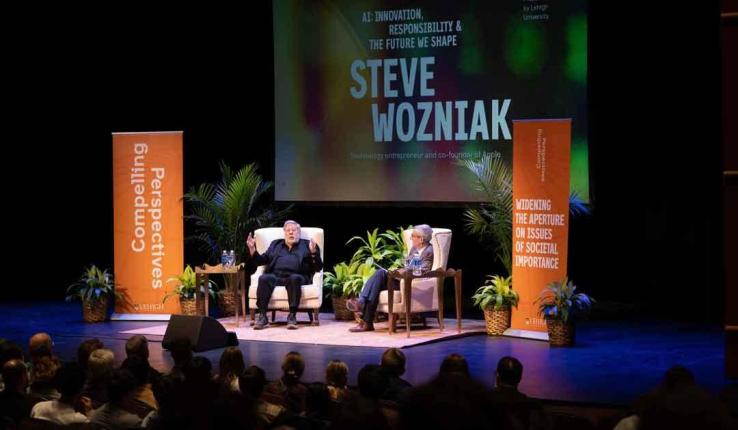“This partnership is so exciting because it helps deeply integrate engineering, neuroscience and data science expertise—all things Lehigh University excels at—directly into Good Shepherd’s programs and services for people with disabilities,” said Spigel. “By joining forces with Lehigh’s nationally recognized researchers, we now have greater ability to tackle real-world challenges with innovation grounded in collaboration.”
Elizabeth (Beth) A. Dolan, dean of Lehigh’s College of Health, said that the partnership is a milestone for the College of Health and the university in expanding research impact in health and health care.
"By joining forces with Good Shepherd, we're able to recruit outstanding faculty whose work relies on clinical environments and will, in turn, offer innovative solutions applicable to clinical practice,” said Dolan. “This collaboration provides a unique opportunity for our faculty and students to address real-world health challenges and make a tangible impact on the lives of people with disabilities in the Lehigh Valley and beyond."
In August 2024, Lehigh University and Good Shepherd Rehabilitation formalized the partnership through a signed Memorandum of Understanding, laying out a 10-year vision to include interdisciplinary research collaborations, joint faculty appointments to bridge academic research and clinical practice and a jointly funded seed program to support new research.
A milestone is the appointment of two joint faculty members, the first-of-its-kind hire for both institutions. The first is Shirin Madarshahian, a motor control researcher and a data scientist in Lehigh’s College of Health, who studies how the brain and body control movement and uses data to improve clinical treatments for individuals with disability; the second is Juan Aceros with the university’s P.C. Rossin College of Engineering and Applied Science, whose research focuses on engineering and medical device solutions that enhance accessibility and independence for this population. These appointments reflect a shared commitment to integrated academic research, clinical insight and technological innovation to improve the lives of people with disabilities.
“I view my joint appointment as an invaluable opportunity to advance my goal of promoting neuromodulation and reshaping clinical practices through development of more objective, technology-driven assessments and interventions—particularly in the field of neurorehabilitation,” said Madarshahian. “This role grants me direct access to diverse neurological populations and clinical datasets, as well as firsthand exposure to the barriers that often prevent research from translating into everyday clinical practice.”
Aceros, associate professor in the department of Bioengineering, joined Lehigh in 2025 from a faculty position at the University of North Florida. He said he is incredibly excited to take part in this partnership.
“The university’s focus on advancing research at the intersection of health and engineering, coupled with its commitment to the partnership with Good Shepherd, aligns perfectly with my research interests in developing innovative engineering solutions that improve quality of life by enhancing accessibility and independence for individuals with disabilities” Aceros said. “I’m eager to collaborate with my colleagues and the clinical team at Good Shepherd to translate our evidence-based research into practical, technology-driven solutions that directly benefit the community.”
The partnership also advances Lehigh’s Center for Community-Driven Assistive Technologies (CDAT), one of three new University Research Centers (URCs), which aims to transform the lives of people with disabilities through interdisciplinary research and cutting-edge emerging and existing assistive technologies. Researchers will develop new and innovative approaches to empowering people with disabilities and expand opportunities in education, employment and health.
Even before the partnership was formalized, CDAT’s core faculty team has been engaged in ongoing discussion around shared space and models of partnership with Good Shepherd—a testament to the passion and commitment this team shares for its mission.
Stephen P. DeWeerth, dean of the P.C. Rossin College of Engineering and Applied Science, noted the impact the partnership may have on the Lehigh Valley community and beyond.
"The synergy between Lehigh’s engineering and health colleges, combined with Good Shepherd's clinical expertise, creates a powerful engine for innovation,” DeWeerth said. “It's truly inspiring to witness the collaborative energy of our faculty, particularly the CDAT team. This partnership is a testament to the team's commitment to improving the lives of people with disabilities through innovation in technology.”
The partnership will allow Lehigh students to gain real-world training in rehabilitation and healthcare through internships and other applied learning opportunities at Good Shepherd. Combining Lehigh’s research excellence with Good Shepherd’s hands-on clinical expertise and century-plus track record of caring for people with disabilities, early examples of key projects include:
· Partnering on a wayfinding app that uses robotic mapping technologies to develop digital indoor maps that improve accessibility for people with disabilities
· Studying wearable technology that helps people with dysphagia, a swallowing disorder affecting more than 9 million adults annually
· Conducting a Community Health Needs Assessment to understand the needs of children and adults with autism and other neurodivergent conditions in the greater Lehigh Valley
· Re-engineering a recreational therapy table gaming system that offers a source of joy and connection for residents of Good Shepherd Home-Bethlehem, a long-term care home for people with severe disabilities, to play and interact from their wheelchairs
Spigel and Emily Lyter, administrative director for Good Shepherd Learns, Creates, and Clinical Research, were instrumental in orchestrating the partnership. While Urban, Dolan and Matthew Mattern, senior director of corporate and foundation relations, were the primary drivers for Lehigh University to bring the partnership to life over the past three years, leadership across all five colleges have added their support to drive the partnership. DeWeerth and Robin Hojnoski, dean of the College of Education, have both played an important role in bringing to bear the resources of the P.C. Rossin College of Engineering and Applied Science and the College of Education, respectively—central players in CDAT and its work to transform the lives of people with disability.
Story by Katie Jones





